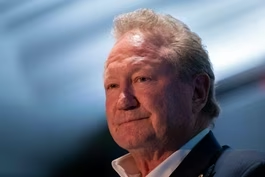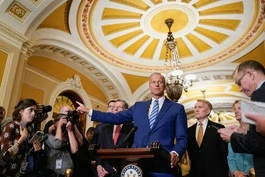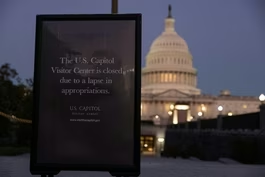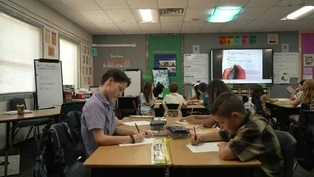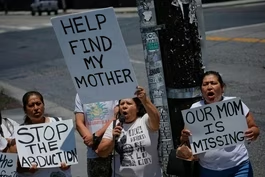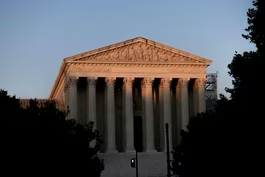
Palestinians return to ruins where homes once stood
Clip: 10/15/2025 | 8m 18sVideo has Closed Captions
Palestinians return to ruins where homes once stood as Israel awaits remains of hostages
The process of returning dead hostages continues as the fragile ceasefire between Israel and Hamas holds. Israel accuses Hamas of stalling the return of remains as promised in the deal. Hamas and the Red Cross say Israel’s destruction in Gaza has made recovery nearly impossible. As Leila Molana-Allen reports, Palestinians who survived the war are returning to ruins where their homes once stood.
Problems playing video? | Closed Captioning Feedback
Problems playing video? | Closed Captioning Feedback
Major corporate funding for the PBS News Hour is provided by BDO, BNSF, Consumer Cellular, American Cruise Lines, and Raymond James. Funding for the PBS NewsHour Weekend is provided by...

Palestinians return to ruins where homes once stood
Clip: 10/15/2025 | 8m 18sVideo has Closed Captions
The process of returning dead hostages continues as the fragile ceasefire between Israel and Hamas holds. Israel accuses Hamas of stalling the return of remains as promised in the deal. Hamas and the Red Cross say Israel’s destruction in Gaza has made recovery nearly impossible. As Leila Molana-Allen reports, Palestinians who survived the war are returning to ruins where their homes once stood.
Problems playing video? | Closed Captioning Feedback
How to Watch PBS News Hour
PBS News Hour is available to stream on pbs.org and the free PBS App, available on iPhone, Apple TV, Android TV, Android smartphones, Amazon Fire TV, Amazon Fire Tablet, Roku, Samsung Smart TV, and Vizio.
Providing Support for PBS.org
Learn Moreabout PBS online sponsorshipAMNA NAWAZ: Welcome to the "News Hour."
The slow process of returning dead Israeli hostages home continued today as the fragile cease-fire between Israel and Hamas holds.
GEOFF BENNETT: Israel accuses Hamas of stalling the return of hostage remains promised in the cease-fire deal.
Hamas and the Red Cross say Israel's destruction in Gaza has made their recovery nearly impossible.
And, as Leila Molana-Allen reports again tonight, Palestinians who survived the war are returning to ruins where their homes once stood.
LEILA MOLANA-ALLEN: As the skies fell silent in Gaza after a long awaited cease-fire, the clearing smoke revealed a postapocalyptic scene, once bustling neighborhoods full of life now a sea of rubble, bodies of the people who once lived here scattered along Gaza's seashore, as emergency workers attempted to identify their decayed remains and restore their dignity in death.
While bulldozers have begun clearing the crushed and hollow ruins of this besieged enclave once buzzing with life and community, for many Gazans, there is little left to salvage.
MOHAMMED ZAQOU, Displaced Palestinian (through translator): Our home was targeted and demolished about a month ago.
We were displaced to Deir al Balah.
We came back to the house yesterday and we expected to finally return to a home to shelter us, but it was completely destroyed.
LEILA MOLANA-ALLEN: Mohammed Zaqou has finally returned to his home in Gaza City after being forced to flee south in the face of Israel's assault.
But in place of his house that was filled with love and laughter, all he found left was a crumbling concrete husk.
MOHAMMED ZAQOU (through translator): Our memories are gone.
All our dreams are gone.
Our childhood is gone.
I'm trying to see what I can pull out of the rubble.
It's all burnt now, all these burnt clothes.
It feels like there's no point trying anymore because it's all destroyed.
LEILA MOLANA-ALLEN: As Gazans try to rebuild their lives in the ash-covered ruins left by two years of relentless Israeli bombardment, here in Israel, having threatened yesterday to limit desperately needed aid supplies, this morning, the government allowed a lifeline into the occupied Strip, trucks bearing food, water and medical supplies.
But the resumption of aid deliveries and the cease-fire itself is shaky at best.
Israel is demanding Hamas release the last of the bodies of deceased hostages still in Gaza, even as Israelis celebrate the war's end and mourn the loss of loved ones.
Moshe Lavi brother-in-law Omri Miran was taken from Kibbutz Nahal Oz on October 7 and finally returned home alive on Monday.
But his community will never forget those they lost.
MOSHE LAVI, Relative of Returned Hostage: He's in a stable condition, and he will heal.
Both the physical wounds and the mental scars will heal with time as much as possible.
We as a family will continue to support Omri, Lishay, and the girls as they become a family again.
We have to keep fighting for the remaining hostage families and ensure that everyone has a closure.
LEILA MOLANA-ALLEN: Do you believe in the cease-fire deal?
And what other challenges you now see ahead for your family, your country, this region?
MOSHE LAVI: I trust that our society will be able to rebuild and heal once we close this chapter of the return of the hostages.
And when it comes to the Israeli-Palestinian conflict, the cease-fire is not going to solve the conflict.
I believe that eventually we will find a resolution to our conflict.
I don't know whether it will be in my lifetime, but I will work with anybody who would want to find a resolution.
LEILA MOLANA-ALLEN: Both Israelis healing from Hamas' terror attack and the ensuing hostage crisis and Palestinians trapped by war and occupation and tormented by two years of harrowing death and destruction pray this fragile piece holds long enough for them to begin to move beyond the shadow of October 7, to rebuild, to hope for a brighter future.
The hope for civilians on both sides of the border here, but there's a long road ahead until they can get there -- Geoff.
GEOFF BENNETT: And this initially seemed like a fairly straightforward agreement.
What has made this process more challenging than expected?
LEILA MOLANA-ALLEN: It did seem straightforward.
The bodies of all the living and deceased hostages would be returned within 72 hours of this agreement being signed.
There was a stipulation in that agreement that all the bodies that Hamas knew their whereabouts would be returned and then they could give information to Israel and the U.S.
about where they thought other bodies might be for assistance.
What happened is that, on Monday, the 20 living hostages came back, and then, in the evening, just four of the 28 bodies of the dead hostages were returned.
That prompted a huge outcry from Israeli society, from the hostages' families, saying that that wasn't what they expected.
That means that Prime Minister Netanyahu has been under incredible pressure to get the rest of the bodies back as quickly as possible.
Hamas has returned some of the bodies in the last few days.
And when those bodies were identified, it turned out that one was not even an Israeli hostage, but in fact the body of a Gazan person.
Now, President Trump has put a huge amount of pressure on Hamas as well to get all those bodies back, but he did today speaking to reporters in the Oval Office acknowledge just how difficult this job is.
He said they're digging through the rubble, they're trying to find these bodies, it's a horrible job and they don't know when they will get there.
So he seems to be trying to make this deal hold long enough that Hamas is able to return all the hostage bodies it can.
They have confirmed that thus far they have returned everyone.
They know their whereabouts, and they need more time to search.
GEOFF BENNETT: So remind us, what comes next in this peace plan and how realistic is this next stage, given the situation on the ground?
LEILA MOLANA-ALLEN: Well, the problem here, of course, is that there is this huge Trump 20-point peace plan from the president that we're looking at, but most of that hasn't actually been negotiated.
All that's been negotiated here is this very first phase.
Now, there was a really telling quote last week from the prime minister of Qatar, who said after that deal was signed, he said, if we tried to go for full negotiation of this peace plan, we would never have got a deal.
Now, this evening, speaking to reporters, officials in the White House confirmed that they are still in that deconfliction phase, they are still focusing on getting all the hostages out and getting aid into Gaza.
But what comes next is incredibly complicated and none of it has been confirmed.
Firstly, will Hamas demilitarize?
Will they lay down their arms?
They have not confirmed that they will do so.
And Prime Minister Netanyahu of Israel says that there is no way this deal will go ahead unless they do.
Secondly, will the IDF really withdraw and hand over to this international stabilization force that hasn't really been particularly identified yet how it's going to take form?
Right now, they are pulling back to half of the Strip, 53 percent.
They're then supposed to pull back to a further 40 percent, and then a buffer zone in the long term.
But that really isn't clear whether or not they will be able to pull back to that point and whether that international stabilization force will be able to control Hamas.
Thirdly, we have the reconstruction issue.
They have so much rubble to clear to try and build homes, to try and make Gaza livable again.
And then after that happens, what is the future of Gaza?
What's the future of the Palestinian territories?
What is this technocratic committee that's going to run the Palestinian territories as they stand?
Netanyahu has said that he will not allow the Palestinian Authority to be in control of that.
It's very unclear who would be there and what could be agreed upon between all the different forces at play.
So the road ahead is incredibly long, wildly complex and really undefined.
We may not see peace in the near future.
GEOFF BENNETT: Leila Molana-Allen again for us in Tel Aviv tonight.
Leila, our thanks to you.
Billionaire mining executive betting on green energy
Video has Closed Captions
Clip: 10/15/2025 | 5m 54s | Why a billionaire mining executive is betting on green energy (5m 54s)
Democratic, GOP strategists on political fallout of shutdown
Video has Closed Captions
Clip: 10/15/2025 | 8m 16s | Democratic and GOP strategists on the political fallout of the government shutdown (8m 16s)
Federal workers on how the shutdown is upending their lives
Video has Closed Captions
Clip: 10/15/2025 | 8m 4s | Federal workers describe how the shutdown is upending their jobs and daily lives (8m 4s)
How students are faring in Arizona's voucher program
Video has Closed Captions
Clip: 10/15/2025 | 8m 23s | How students are faring in Arizona's voucher program that could be adopted nationwide (8m 23s)
News Wrap: Pakistan, Afghanistan agree to ceasefire
Video has Closed Captions
Clip: 10/15/2025 | 5m 16s | News Wrap: Pakistan and Afghanistan agree to a 48-hour ceasefire after days of clashes (5m 16s)
What justices signaled in Supreme Court redistricting case
Video has Closed Captions
Clip: 10/15/2025 | 7m 21s | What the justices signaled in a Supreme Court case that could reshape electoral maps (7m 21s)
Providing Support for PBS.org
Learn Moreabout PBS online sponsorship
- News and Public Affairs

FRONTLINE is investigative journalism that questions, explains and changes our world.

- News and Public Affairs

Amanpour and Company features conversations with leaders and decision makers.












Support for PBS provided by:
Major corporate funding for the PBS News Hour is provided by BDO, BNSF, Consumer Cellular, American Cruise Lines, and Raymond James. Funding for the PBS NewsHour Weekend is provided by...
